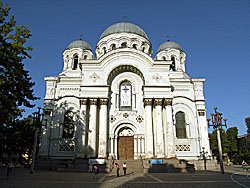My first trip to Lithuania, in 1992, went to Kaunas, and the first Science Fiction convention in Lithuania visited
by westerners. The Kaunas visits have been few and far between, but I was back in 2005, astonished that not very
much had changed. Kaunas has some sort of minority complex for having been revoked the title a capitol, a title
it held during the years 1922-1939 when Vilnius was in the so-called “Polish corridor” between Lithuania and Russia.
Kaunas is very nicely situated at the conflux of the two mightiest rivers in the land; Neris and Nemunas and could,
if they wanted to invest, be a fine tourist attraction, just like Vilnius.
Kaunas - Dead City?
|
| Or at least dying. Lithuania’s ex capitol, somehow locked in a time trap. If you want to
see Kaunas like it was 25 years ago, go there now. There’s no difference. Myself, I can vouch for the last 13 years.
Let’s start with a walk around town a Saturday afternoon in 2005. It unfortunately turned into a walk down memory
lane. It’s in the middle of summer and perhaps everyone gone
to the coast to bathe? I had hoped to find gallant memorials, but instead I found facades that had not seen a rowel
in a very long time. We wondered were all the street life had gone. Laisves aleja (Freedom Alley) was more or less dead. I have never seen so many abandoned, closed cafés.
While the high-risers mushroom in Vilnius, not many bulldozers have made their mark in central Kaunas. The plaster
comes off and bricks are falling right on high street. I know why, but it may not be good for me to say it out
loud... |
|
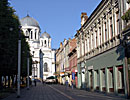
|
The fountain on Freedom Alley has lost its benches and the lampposts have gone crooked. The fact that the finest
house on the street has... |
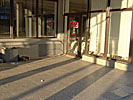
|
windows with curved glass is no extenuating circumstance.
A previously well-known pharmacy is now filled up with junk. |
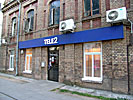
|
The Swedish mobile operator Tele2’s great facade. The upper floor seems to have had a fire. Compare to Tele2’s
stainless palace in Vilnius. |
Jurgis Kairys - the Man Without Nerves
|
|
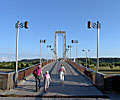
|
A bridge over river Neris, on a side street of Freedom Alley. |
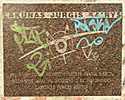
|
At the middle of the bridge one finds a plaque honouring the city’s son Jurgis Kairys, a stunt flyer daring
anything. And then some. He is the world aerobatics champion and the plaque honours his upside down flight under
this bridge in 2000. He then went on to fly under all the ten bridges in Vilnius in front of all the world’s media.
The state of the plaque is less honouring. How can they let the graffiti just stay there, if they are proud of
their pilot ace? |
|
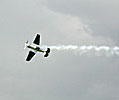
|
Kairys is a crazy man, wholly without neves. Here he is doing a knife-edge at low altitude over the strip at a... |
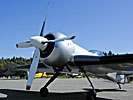
|
...airshow at Tullinge airfield near Stockholm. His machine is custom made, consisting only of a pair of wings
stuck on a very big engine. |
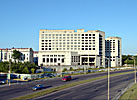
|
Some distance from the bridge was this ghost house, a half finished hotel. E.g. some of the widows are not mounted.
Some thinks it should be dynamited and replaced by something else. |
The Cultural Centre, ex Unions Palace, ex Nazi Prison
I never thought I would be doing this comparison. This is the convention building on Vytautas prospekt I visited
in 1992. It is still the same broken, dirty, dreary house. The poster boards along the street are exactly the same.
Plaster is still missing below the roof. In the Second World War the Nazis used it as a transfer station for those
who were to be deported to the Stutthof concentration camp. These are no happy memories.
|
|
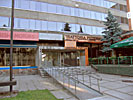
|
This hotel was the living place for all the East fans during the 1992 SF convention. Today it’s a ghost house. |
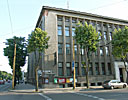
|
The convention palace, in 1992 the Union’s palace, today the Kaunas Cultural Centre. But it still looks the same. |
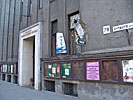
|
The door looks exactly like it did then. The poster boards too. I wonder if the café in the cellar has changed? |
|
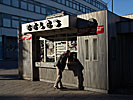
|
“Geles” means “flowers”, but it looked more like cigarettes and flaking-off lettering. |
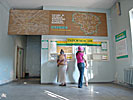
|
The modern, shiny, gleaming new bus station. Nah. Damp-stained and dirty. This is what the tourists see. |
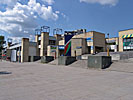
|
In the suburbs the Soviet Union is still alive. It would of course be asking too much to just tear down a shipping
centre because it’s Soviet-ugly. But they could do something??? |
Churches and Public Buildings
|
| A closer look at Kaunas’ old town uncovers some niceties. Kaunas is maybe not so bad after
all. |
The Church of Michael the Archangel, Kaunas’ old garrison
church.
|
|
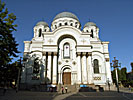
|
The church at the end of Freedom Alley, the one I thought would be renovated first, still has its plaster falling
off, iron rusting and the door varnish flaking. It was built in 1891 for the soldiers at Kaunas’ fort, named The
Orthodox Cathedral of Sts. Peter and Paul, but was renamed several times, when in 1992, under Communism it became
an arts museum |
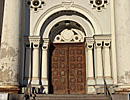
|
It was returned to the arch bishop in 1991. Damages from 50 years of oppression have still not been restored in
2005. |
The Vytautas Church
|
|
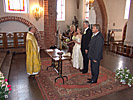
|
We visited a wedding in the Vytautas Church. Just look at them standing there, giving a lot of hard-to-follow promises. |
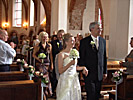
|
The wedding is over ant the couple walks out, just thinking about the coming evening’s extensive use of food and
drink. |
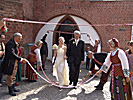
|
Outside, they will walk over traditional bands symbolising ???? |
|
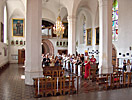
|
A final overview of the interior of the Vytautas Church. |
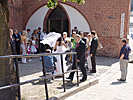
|
Another couple just finished before we came. Note the scale on the wall beside the door. Neris rose that high during
the flood in 19??? |

|
Later, the couple amuse themselves striking various poses, such as by the door of the city all, the “White Swan”. |
The White Swan, the City Hall
|
|
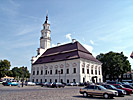
|
The City Hall is officially named the White Swan. Because of the colour, see? |

|
It’s also called the Wedding Palace, because all registrar marriages weddings happen there. |
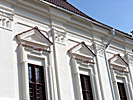
|
A close-up of the very beautiful facade. |
Other Churches
|
|
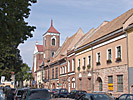
|
In another part of the Old town is the Basilica of Sts. Peter and Paul. |
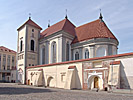
|
The Trinity Church is also located at the Old town great square. |

|
A statue of the famous bishop Motiejus Valancius is placed right next to the Trinity Church. |
Museums and Memorials
|
| Kaunas has two really great museums that you can’t afford to miss: The Ciurlionis Museum
and The Devils Museum. For those interested in war there is a whole lot of forts from tsarist time left around
town. |
|
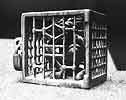
|
The Devils Museum
Kaunas has a devils museum. It displays the collections of Antanas Zmuidzinavicius (that’s difficult to say even
for a real Lithuanian), a guy who spent his life collecting images of devils. There are riding devils, lying devils,
flying devils and devils in cages. Also devil’s masks and devil’s accessories. This museum must be quite unique
and anyone passing through Kaunas ought to visit it. |
|

|
The Ciurlionis Museum
The guy with a capitol G, or maybe a C, or an F-sharp perhaps, Lithuania’s all-time greatest composer, painter,
poet and do-all, Mikolajus Ciurlionis (1875-1911), has his own museum in Kaunas, with the impressive name “National
Museum of M. K. Ciurlionis” in which you can spend aeons admiring his paintings inspired by Lithuanian folklore,
science fiction, mysticism, and what have you. I was there once but didn’t understand just how “great” Ciurlionis
was, and didn’t make any pictures. Numbskull. You’ll have to do with the
museum’s link in the meantime. |
| In the year 1887 they started building a double ring of fortresses around Kaunas, but they were never finished.
The forts are rather overgrown today and filled with water, and will need a great deal of adventurousness. Except
for the Ninth Fort, used by both Germans and Soviets for execution of Jews and dissidents. It is now a national
monument. |
Kaunas is badly situated because of a large dam, Kauno Marios, built to stop the close by river Nemunas from
flooding its riverbeds every spring, on its way to the coast. The dam gives hydroelectric power to the city, but
it may also be lethal. One little bomb here and the whole of Kaunas downtown will be drowned. I will make pictures.
The Junior Athletics European Championships in July 2005 was held in Kaunas. Mean rumours told that it was an
organisational catastrophe, because they had forgotten to check if there were hotels enough for the athletes, trainers
and other supporting staff. They had to sit on their bags in the street, more or less. Should one believe that?
No. Stop it! I really hope I’ll be able to write something nice about Kaunas in the near future!
